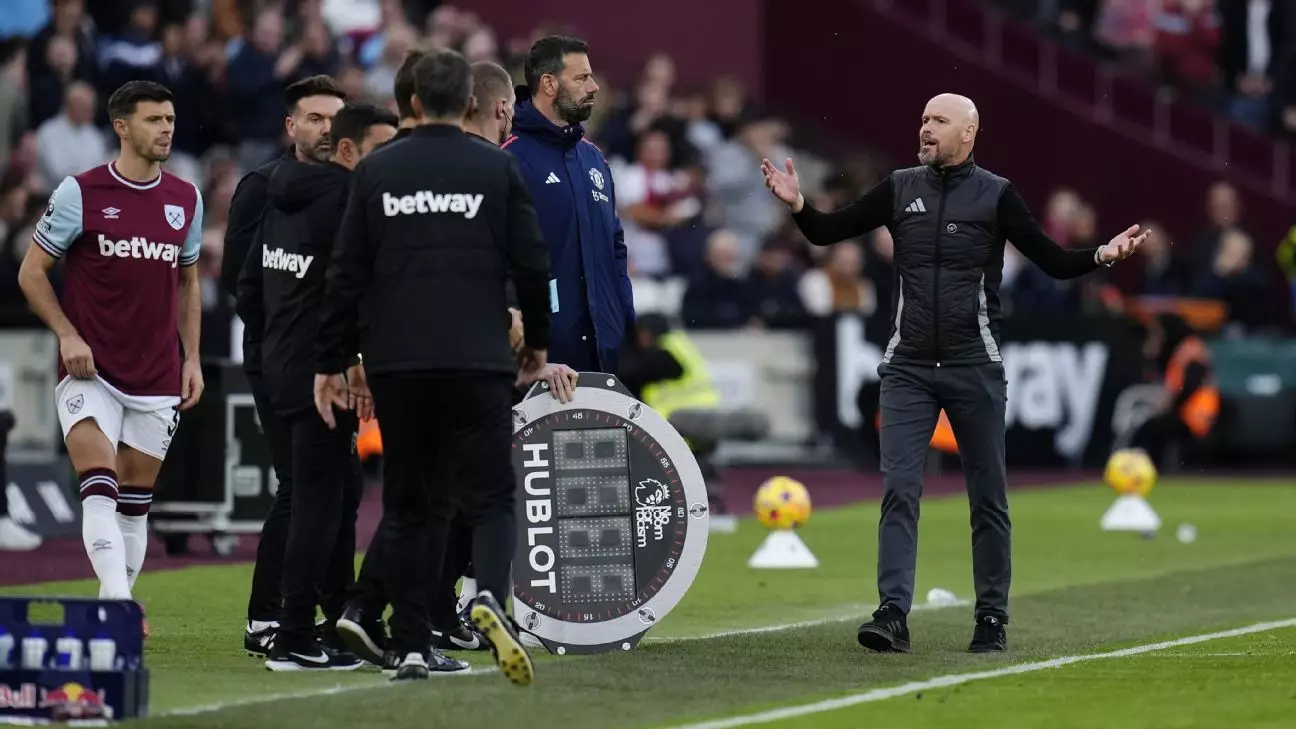The landscape of Premier League football continues to be tumultuous, as Erik ten Hag recently confronted the fallout from a contentious VAR decision that impacted Manchester United’s match against West Ham United. This incident not only stirred debate among fans and analysts but also cast a spotlight on the broader implications of officiating standards and the struggles of a once-dominant team.
In a match that saw United battling for a much-needed point, the climax arrived when a controversial penalty was awarded to West Ham after a questionable on-field review by referee David Coote. Matthijs de Ligt’s encounter with Danny Ings was minimal at best, but VAR, overseen by the seasoned Michael Oliver, deemed it worthy of intervention. This decision led to a successful penalty conversion by Jarrod Bowen, ultimately securing a 2-1 victory for West Ham. Ten Hag’s vehement criticism of the process underscores a significant concern: the application and consistency of VAR rulings are increasingly coming under fire.
Ten Hag articulated his frustration, emphasizing that in football, outcomes often contradict expectations, where the better-performing team does not always emerge victorious. His remarks highlighted the concern that the so-called “clear and obvious” standard set for VAR interventions is being inconsistently applied, complicating the integrity of the game. This inconsistency has raised further questions about accountability and the implications of subjective interpretations in crucial moments.
Beyond lamenting the specific call, Ten Hag extended his critique to the officiating process itself. He pointedly noted that while VAR should act only when there’s a clear and obvious mistake, the reality appears muddled. Such discrepancies were evident in prior matches; for example, during a game against Tottenham, VAR chose not to intervene decisively when Bruno Fernandes faced an apparent red card offense. This inconsistency raises critical questions about training standards for VAR officials and the criteria employed in decision-making.
Additionally, Ten Hag refrained from criticizing individual officials but directed his ire towards the procedural flaws that allow for such controversial calls to impact the game. His comments suggest a growing frustration among managers regarding the effectiveness of the officiating framework, particularly during high-stakes matches where each point is critical for a team’s standing.
The defeat at West Ham has compounded Manchester United’s struggles this season, leaving them languishing in 14th place. This precarious position is emblematic of a larger crisis that has gripped the club, as they have garnered only three wins from nine Premier League matches. Ten Hag attributed part of this disarray to a lack of fortune, indicating that luck is not on their side so far this season. Such statements may serve as a coping mechanism, but they also reflect a concerning reliance on external factors rather than internal improvements.
The inability to secure points has fueled anxiety among United’s fanbase, resulting in renewed scrutiny of Ten Hag’s managerial choices and the club’s strategy moving forward. Players must shoulder some responsibility, yet it’s evident that a systemic overhaul is overdue. The manager must find a way to instill confidence, discipline, and cohesive tactics if United hopes to avoid further decline.
In the coming week, Manchester United faces the pivotal task of regrouping as they prepare for a clash against Leicester City in the Carabao Cup. Following that, they will go head-to-head with a resurgent Chelsea, which has proven formidable under new management. For Ten Hag, these matches represent not only opportunities to regain momentum but also tests of resilience and tactical adaptability.
To navigate this turbulent period, Ten Hag must galvanize his squad, instilling a sense of purpose and urgency. The team’s performance in these upcoming fixtures could either mark a turning point or exacerbate existing tensions. Regardless, the challenges faced by Manchester United today go beyond the pitch; they encapsulate the pressing need for clarity and consistency in officiating, combined with the urgency for the club to reforge its identity amid adversity.
As Erik ten Hag navigates this difficult chapter, he stands not only as a manager addressing immediate crises but also as a voice calling for change and clarity in the broader context of football officiating. The stakes are high, and the path ahead requires both strategic insight and an unwavering commitment to the principles of the game.
